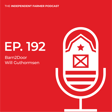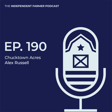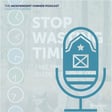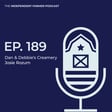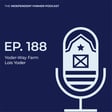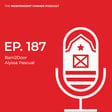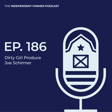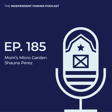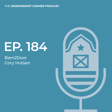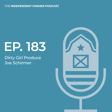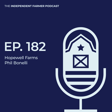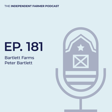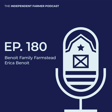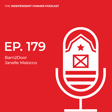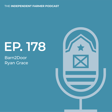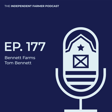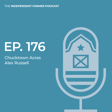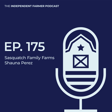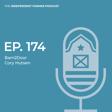Become a Creator today!Start creating today - Share your story with the world!
Start for free
00:00:00
00:00:01

$1 Million Farm Tactics
There is no silver-bullet to supercharge your Farm growth. There are a handful of persistent efforts that have brought success to a number of Farms across the country. From simplified product offerings to consistent marketing, here are $1 million Farm tactics.
Find more Farm resources to spur sales: https://www.barn2door.com/resources
Transcript
Introduction to Empowering Farmers
00:00:10
Speaker
Hello and welcome to the Independent Farmer Podcast, the go-to podcast for do-it-yourself farmers who are taking control of their own business, skipping the middleman, and selling direct to local consumer and wholesale buyers. This podcast is hosted by Barn to Door, the number one business tool for independent farmers to manage their business, promote their brand, and sell online and in person. Let's dive in to today's Independent Farmer Podcast.
00:00:44
Speaker
Welcome to the Independent Farmer Podcast.
Meet Richard from Barn to Door
00:00:46
Speaker
I'm James, the Chief Operating Officer of Barn to Door and your host for today's episode.
00:00:51
Speaker
As many of our listeners may be aware, Barnadore offers an on-one solution for farmers on direct, online, and in person. In today's conversation, we're going to get into the best practices used by farmers whose annual revenues exceed $1 million per year. Today, I'm happy to welcome Richard to the Independent Farm Podcast. Richard is a farm account manager here at Barnadore.
00:01:15
Speaker
working alongside many of our most successful farms across the country. Now, Richard's been with Barnadore for more than three years. He has given great advice and worked with many farms looking to scale their business, increase their sales, and serve their communities well. He works with many of our biggest farms, including those that make more than $1 million per year.
00:01:36
Speaker
I'm excited to talk with Richard today about the tactics and best practices utilized by million dollar farmers across the country. Welcome Richard, it's great to see you. It's great to see you as well, James. Always a privilege to be able to pop on the podcast with you. Well, thank you so much for taking time out of your busy day. I know you've been on calls all morning with farmers and you've got a full slate this afternoon. So thanks for taking time out of your lunch hour to have this conversation with me. Richard, before we dive into today's topic,
00:02:05
Speaker
Let's dive into a little bit more about your tenure at Barn to Door. You've been here for several years and be great for our listeners to understand what you do day to day. First and foremost, I have the privilege to work with hundreds of farms across the country. Currently I'm managing about 400 farms and ranches right now, which is a ton of fun, but you know, it's a busy time of year, but hey, it's a privilege to be able to serve farmers here. While there are a few outliers of
00:02:32
Speaker
The vast majority, about 95% of the farms I work with, focus primarily on proteins, produce, or dairy products, or a combination thereof. But I spend most of my time working with producers, not only in making sure they're familiar and comfortable working with Barnador and the platform there, but importantly, marketing best practices. How do they access more customers, increase sales, and find ways to save time?
00:02:56
Speaker
Those are our big three, increased sales, access more customers and save time. And a lot of this podcast, we're going to be diving into those first two, increasing sales and accessing more customers. Because obviously, if you're going to grow your business, you need to have a lot of customers and you need to have a lot of sales, especially more than a million dollars a year.
Evolving Market Strategies
00:03:15
Speaker
Now, I imagine we have a lot of aspirational farmers out there who may just be getting started or maybe they've been in business for a long time and they've been stuck at quarter million to half a million, but their goal is to get to $1 million or more. I imagine you talked to a lot of farmers who might be looking for a silver bullet to supercharge their growth. Now, given your tenure and experience, what can you share generally about our most successful farmers?
00:03:41
Speaker
Well, that term silver bullet, you're right. It's something that a lot of folks are looking for. You know, how do they take that next step and what's going to be the most surefire way to get there? But candidly, there is no such thing as a silver bullet in this type of business or this type of industry, right? To build a successful business, it's going to take persistent efforts.
00:04:02
Speaker
And it's going to require that you evolve your go-to-market strategy in order to meet the expectations of your buyers. And that's huge when it comes to taking that step from, like you said, a quarter or a half million dollars to one million. You have to make sure you're meeting the expectations of your buyers. Many farmers we've worked with have great, great products but are falling short of their goals or are finding that they're not meeting what they define as success.
00:04:28
Speaker
In contrast, there's a lot of farms that have okay products, but are highly, highly successful and are achieving and even surpassing their sales goals. A good analogy or a good comparison would be to look at Starbucks, the household name in today's day and age. Most folks would agree that their coffee may not be the best, but they're highly, highly successful. It's satisfactory product.
00:04:51
Speaker
But they are absolutely the best when it comes to meeting the expectations of the buyers and what the buyers are looking for for their coffee and perhaps a breakfast, right? That translates into a highly successful business model. And that's really no different for farmers and producers that we can work with. Well, that's great feedback, Richard. Thanks for the additional context. I agree with you wholeheartedly. There is no silver bow. Plus, like you said,
Five Key Tactics for Success
00:05:16
Speaker
But let's dive into what does work for farms that exceed $1 million in annual sales, right? We know nine out of 10 buyers want to purchase products from a local farmer. What are the five key tactics these farms are implementing to help them stand out against the competition and really drive growth?
00:05:34
Speaker
Yeah, that's a good question. So when we're looking at the million dollar plus farms, they are all selling staple products, things that people routinely buy and that are household familiar products. Humans are creatures of habit, right? And we can dive into a little bit more on what staple products might look like. Proteins, produce, and dairy, I'd assume. Yes, exactly. Or consume regularly. It's on everybody's grocery list constantly.
00:06:00
Speaker
Precisely, things like ground beef, dairy products are always in refrigerators and in households. Like I said, produce regular items that people consume on a daily basis.
00:06:10
Speaker
In addition to selling staple products, they offer a really simple inventory, an easy buying experience. You'll probably hear me say this time and again today, but convenience is extremely important when it comes to buyer conversion and developing repeat customers. We want to make sure we're again meeting those expectations of buyers when it comes to being online and ordering online today.
00:06:32
Speaker
As mentioned before, persistent marketing efforts is key. This isn't going to be something that happens overnight or even happens by accident, right? To meet these goals and especially a stretch goal like a million dollars in sales, you have to be persistent. That persistence leads to more brand familiarity, more brand familiarity leads to more trust, more trust just leads to more sales.
00:06:54
Speaker
Another very very good tool that a million dollars plus farms have been using are subscriptions. Subscriptions are commonplace in today's day and age and what we've seen is farms that are offering subscriptions can secure a regular income on a month to month basis and in some cases have been able to secure up to 80 percent of their monthly revenue guaranteed month over month due to these subscriptions.
00:07:20
Speaker
And then lastly, I'd say door-to-door delivery. Again, meeting buyers' expectations, making it extremely convenient for your products to arrive at your customer's door is a recipe for success.
00:07:32
Speaker
Well, those five tactics you just mentioned, Richard, seem like really good advice. And I can see why it's translated to such big outcomes for those million dollar farmers selling staple products, offering a simple inventory, persistent marketing, subscriptions, and direct delivery to their doorstep. Five great suggestions. Let's unpack each one of these, because there's a lot of nuance to these, right? Might sound simple,
00:07:56
Speaker
But in practice, there's some real specific things to do that, right? So let's start with number one. Why should farms focus more unstable products than niche offerings?
00:08:07
Speaker
From what we've seen, 90% of what buyers purchase is the same thing week over week. Buyers are just more willing to consistently buy what they know and what they trust, things that they enjoy and things they like to prepare. And if you can trust inconsistent purchases, these staple products, it's much easier to market, to relate to your customer, and to basically pair with other items that are in your web store.
00:08:33
Speaker
A lot of producers I work with are interested in providing niche items, which is great. And it's an excellent way to provide new products to folks, but you cannot or should not try to rely on niche products to exceed such a goal like a million dollars per year. They make wonderful add-ons and they can help you stand out, but you need to make sure you're offering staple products that folks are accustomed to, that they're familiar with, and they know and they trust and are excited to purchase from you.
00:09:01
Speaker
Yeah, people are going to come back and keep consuming proteins, produce, and dairy every single week, right? And so this idea of upselling and selling niche products as an add-on is also a fantastic way to expand your average order value as well. Increase your AOV and make more money per order, right?
00:09:19
Speaker
But those staple products, people have it in their monthly budget, whether you're a consumer or you're a chef at a restaurant, they've got a budget and they know that they have to put certain things on the plate every week. And so I can understand why these big million dollar farms, they just nail the core of their revenue with these staple products.
00:09:37
Speaker
Let's talk about number two, why is inventory mix so important? What should the inventory or the purchase experience look like if you're going to one of these $1 million plus farmers? Yeah, great question. We've seen that the buyers usually get decision fatigue or if there's too many offerings or too many items in front of them, it can be more challenging for your customer to commit to a purchase.
00:10:03
Speaker
Best practice we've seen is really keeping your inventory under 50 items total on the web store. A great option to manage that is to pin your popular items to the top of the store. The first items that folks will see when they're browsing online in any retail experience are going to be the ones that drive the most revenue. 60% of products purchased from our top grossing farms are pinned to the top of the store. These are just the first items that folks will see when they open up the web store.
00:10:31
Speaker
Wow, that's a big deal. So that means they're just going to the page, they see what's at the top. This is what the farmer has pinned to the top as my figure of five choices that they're recommending. They're just saying, yep, sign me up.
00:10:43
Speaker
That's exactly right. You're helping your customer out so much by helping make that decision for them. And again, you'll hear me say it again and again, but convenience really is king when it comes to being online, driving revenue and meeting the expectations of your buyers. Another great tool in addition to pinning popular items to the top of your web store is offering bundle boxes.
00:11:05
Speaker
Bundle boxes allow you to offer a mix of your products that are exciting to buyers and importantly can increase your average order value. Now, most importantly is to offer a farmer's or a rancher's choice bundle box. This allows you as the producer freedom to have some flexibility in what you're putting in the boxes.
00:11:25
Speaker
Buyers are very, very excited. They trust the producer to put the greatest or the best products and the most high demand items in these boxes here. And so there's a little element of surprise. They are putting their trust in you as well. And like I kind of made an illusion to, it allows you to have some flexibility so you can move more of the animal or you can change what you have in these boxes based on what's in season.
00:11:49
Speaker
That has been one of the biggest driving forces for revenue for farms that are offering bundle boxes. That farmer's choice capability is wonderful.
00:11:58
Speaker
Yeah, that's a really great example, right? You know, if you're a rancher, you don't want to pin just one pound of ground beef, just a steak to the top of your store. You want to pin a 10 pound, 20 pound and 40 pound bundle box at the top, right? 10 pounds, got five pounds of ground beef in it, a few steak cuts, and maybe one primal cut, like a T-bone, right? And maybe there's a 40 pound box where you get a T-bone, a ribeye,
00:12:19
Speaker
and a filet, 10 pounds of ground beef, and a bunch of other cuts that the buyer doesn't really know, but your job is to move as much product as you possibly can, stay out of the freezer business, and just like you said, move more product, get a higher average order value, right, by pinning those onto the top of your store. Great suggestion. Well, let's move on to number three. So, I'm a farmer now, I've got a great inventory set up,
00:12:44
Speaker
I'm selling staple products. Talk to me about persistent marketing.
Effective Marketing Strategies
00:12:48
Speaker
How often should a farmer market to their buyers and what avenue should they be doing that?
00:12:54
Speaker
Yeah, great question. In terms of avenues, and we'll dive into each of these here in just a minute, but email marketing is going to be the greatest marketing tool you have at your disposal here. And thankfully, with Barn to Door, we've got to create integration with MailChimp, which is a terrific marketing tool that can make that easy for you. Another great tool, of course, social media, just raising brand awareness online that way. But we cannot also forget marketing in person, more of a grassroots connecting with your local community.
00:13:22
Speaker
not impossible to replace eye contact and a handshake, even in today's very digital world. When it comes to email marketing, high value farmers are sending at least one email per week. Let's say about four total email touches, certainly no less than two emails. So you can't expect to reach a million dollars in sales by sending one monthly newsletter and then nothing for the rest of the month.
00:13:46
Speaker
You may not even be in their inbox if you... Exactly. I mean once a month, because most people don't even sort or archive their email. I think I read the other day, it's like 96% of people never archive their emails. They treat their email like a social feed, like it's just like this huge list. So unless you're on page one, they're never going to see your farm newsletter.
00:14:07
Speaker
Yeah, absolutely. And to your point, marketing online customers are almost inundated with information, whether it's from friends, family, personal emails, other marketing emails coming their way. So don't feel like you are spamming your customers by any means. They need to be reminded. They need to see your brand. They need to have that engagement with you. Otherwise, to your point, James, they may not see you. And unfortunately, a lot of times, it's out of sight, out of mind in today's very, very busy world.
00:14:35
Speaker
Now, social media is a great, great tool for raising that brand awareness as well. And fortunately, I remind producers all the time, you don't have to be a social media influencer to really be successful and meet best practices on platforms like Facebook and Instagram. The most successful farms we work with are really only posting about two to three times per week.
00:14:54
Speaker
It's a mixture of what we call the three E's, education, entertainment, and e-commerce related posts. Education is a great opportunity basically to add value to your products, showcase your practices, and get people really excited to support local businesses and local farms. They trust you as the producer, they trust you as the farmer, the rancher, and so speak with authority and showcase your practices and even the mundane things, your day-to-day chores, what goes on during certain seasons.
00:15:23
Speaker
on how you have to prep or maintain the farm or the ranch. Entertainment, people want to have a relationship with buyers, with their producers. And so showcasing the things that you love can go a long, long way. People want to feel like they're part of the farm or the ranch story and our longest journey with you. And then similar to your email marketing, e-commerce related posts on social media are a great opportunity to remind folks that you are a business, you have products to sell, and this is how you can easily get into the web store and place their orders.
00:15:53
Speaker
But it's important to mix it up, keep your posts informative or funny or have clear calls to action. But you don't want to fall into a rut of marketing or basically saying the same thing over and over on social media. Richard, I completely agree with your feedback on social media. Just having that mix of content is very informative for me, particularly as a buyer, right? I've seen some really great produce farms go through and they're like, they'll cut an apple in half or they'll actually pull product off a tree or out of the ground, tell you what
00:16:21
Speaker
a healthy carrot looks like, or what does a healthy apple look like? And what does a bad one look like, right? Just educating and demonstrating more value, demonstrating your expertise.
00:16:30
Speaker
great way, like you said, to pull your buyers in closer, right? And for them to also value and appreciate the time, care and attention that you're putting into growing and harvesting their products for them, right? Could be milk, could be meat, what have you, right? So that's great. Exactly. Let's talk about, you mentioned about marketing in person. What does marketing in person look like?
00:16:52
Speaker
I mean, there's a lot of shapes and sizes with marketing in person, whether it is farmer's markets and getting involved in your community that way, it could be hanging up flyers or distributing business cards. Even if you are dropping products off at people's homes during your delivery routes, have your packaging with your logo on it, clear, visible in front of folks, because it's like having a billboard in these communities that you're already serving and already doing business in.
00:17:19
Speaker
Marketing person could also be your logo on a delivery truck or magnets and things like that. I would say the most important part of doing in-person marketing, just like social media as well, would be collecting emails, getting in front of customers and keeping that brand top of mind. So a QR code there, I imagine it's like a big deal. I know I've heard from our farmers, they don't just put their farm name and logo on their van, they put a QR code on their van.
00:17:44
Speaker
and then put it on all four sides of their delivery trucks and van. Because when you're running your pickups or drop-offs, other people in the neighborhood are gonna see, wow, look at that convenient farm fresh food on the doorstep or at this kind of location. How do I sign up? And that QR code, everybody knows it's a super easy way to collect it right off the camera on your phone to get signed up and find out more.
00:18:06
Speaker
Yeah, exactly. QR codes have been very, very successful with farmers because exactly to your point, buyers are so accustomed to them now and many of them will scan them out of curiosity, see if they can learn more about you, get plugged in, start developing that relationship. And it makes it easy for you because it's something that the buyer can take care of while they're interacting with your brand, whether or not you are there in person.
00:18:28
Speaker
Now, when they hit that QR code, oftentimes they can have it go to a popup or a specific landing page. What are a couple of the things that farmers do to get people to then actually give them their email? Yeah, that's a great question. Little incentives like promo codes, maybe 10% off your first order up to a certain value, or maybe $10 off your first order. Many producers I work with will provide a little swag or a little branded farm item there, like a truck or hat with a logo after the customer spends a certain threshold, maybe $100, right?
00:18:57
Speaker
But something that is compelling, a little incentive that can get them interested to first engage with you is a great way. I mean, lots of folks want to sign up just to hear from you, but some folks, like I mentioned, just need a little carrot to get over the line.
00:19:12
Speaker
I know a lot of farms do the $10 offer 10% off the first order, but I love the ones that do the trucker hats, right? Cause yeah, another form of marketing for the farmer, right? So not only do you encourage them to go spend their first hundred bucks with you, but then you're giving them a hat that they can wear and they're going to tell other people about your farm, right? It's absolutely like making your own customers billboards for your farm. Right.
00:19:32
Speaker
And just to piggyback off that just a moment, many producers I work with, when they first see someone wearing some of their branded farm material, it's incredible. It's almost surreal when they see someone they've never met necessarily in person wearing their farm hat or has a sweatshirt with a farm logo on it as well.
00:19:52
Speaker
And to your point exactly, that's customers starting to do that marketing for you, which is the best case scenario. So I'm imagining too, Richard, in all the persistent marketing efforts you just laid out, email, social media, in-person, online marketing, in all these cases, a call to action to shop or at a minimum sign up for the newsletter has got to be pretty important, right? Like it's got to be clear and unequivocal, correct?
00:20:18
Speaker
That's absolutely right. Whether it's in person or online, you have to make things easy for your buyers or even potential buyers. So shot buttons should be visible and clear, conspicuous. The call to action or the exact steps you want your potential buyer or buyer to make needs to be spelled out. You shouldn't make any assumptions when you're marketing that your audience
00:20:42
Speaker
and read your mind, if you will, that will understand and comprehend what steps you want them to take. So don't be afraid to spell it out for them. If you're sharing a sign up form on your social media or you've got flyers in person, tell them scan this code to join our mailing list or click this link to get into our web store. Those little calls to action are extremely important and can help with buyer conversion and help with your customers actually making that step.
00:21:09
Speaker
And I certainly know that buttons work. I know that we did another podcast on this exact topic on clear calls to action. Nice big buttons that say shop now or farm store or whatever it may be, make it easy and apparent to prospective buyers.
00:21:25
Speaker
Well, everything you've shared so far, Richard, makes a lot of sense. I can see how those things can certainly help a farmer galvanize more sales. But let's shift gears and talk a little bit about number four.
The Power of Subscriptions
00:21:37
Speaker
You mentioned subscriptions are critical in terms of growing revenue for million dollar farmers. Why are subscriptions such an important tactic to increase revenue so significantly?
00:21:51
Speaker
Yeah. Well, first and foremost, like what you mentioned earlier, buyers, whether it's chefs or other consumers, 90% of what they purchase are the same things every time. So those staple items, proteins, produce, dairy, those types of things. And so that convenience, as I mentioned before, being such an important lever, subscriptions can take those staple items that people regularly order and turn it into a recurring or a standing order.
00:22:18
Speaker
Subscriptions make it easy for your buyers to simply get the same staple products they need every week and every month. And best of all, subscriptions help drive those consistent sales month over month for your farm business. We've seen that up to 80% of sales for $1 million farms are recurring subscriptions, and that's guaranteed income month over month. So in addition to being recurring revenue for your farm, having consistent fulfillments for your buyers, it's
00:22:45
Speaker
Click it and forget it for both the producer and the buyer. So everybody wins. Subscriptions and the subscription model are truly some of the most convenient things for both buyers and consumers. And it is important to note as well that consumers and buyers have subscriptions throughout every avenue of their life. And so they're very accustomed to them. And in many cases, they're looking for subscriptions. Subscriptions seem like a game changer, Richard, for many farms, right? And so instead of starting at zero dollars at the beginning of month,
00:23:14
Speaker
might go into the month knowing they've already got $80,000 in sales guaranteed, right? And they only need to make another $15,000 or $20,000 in one-time purchases to exceed $100,000 in a given month, right? That's an absolutely different business model than trying to start at zero and get to $100,000 sales from the beginning of the month to the end of the month, right? So I can see why
00:23:35
Speaker
all of our big multimillion dollar farms are leveraging subscriptions, not only for buyer convenience, but also for guaranteed recurring income for the farmer, right? What does this absolutely operationally then, Richard, like if farmers know that they've got these orders coming in every month, I imagine it's got to help improve and simplify things in terms of their harvest dates and processing and all that kind of stuff.
00:23:59
Speaker
Yeah, absolutely. Operationally, subscriptions can help streamline your business. They can help you organize your harvesting schedules with your subscriptions. If you sell proteins, maybe you run your fulfillments on the same afternoon that you pick up from the processor in the morning. And to your point earlier, you want to stay out of the freezer business, for example. And same thing with produce. You'll have a streamlined fulfillment schedule that's based on what you're harvesting at that time.
00:24:25
Speaker
you know that the product that you will be receiving is going to the doorstep of your customers.
00:24:30
Speaker
So that's a big deal, right? If I'm a protein farm and let's say I'm harvesting three head of cattle or five head or 10 head of cattle every month, and I'm picking it up from the processor, what you're suggesting is like, hey, do that once a month, pick it up that morning, run back to your barn, assemble your boxes in that same afternoon, run your pickups and your deliveries, right? Nothing goes into the freezer. Everything is just moved that same day. It's a busy day, don't get me wrong.
00:24:59
Speaker
But it's guaranteed income. It's aligned with, again, your harvest schedule. But not like the farmer has to try to go find a buyer. The subscription guarantees that they've already got the buyer on the other side of that bundle box purchase. Same thing, like you said, for produce or dairy, right? Cows have to be milked every day. Dairy's got to be delivered every week.
00:25:20
Speaker
make it happen, make it simple.
Importance of Direct Delivery
00:25:22
Speaker
Let's talk a little bit about delivery. We've talked about delivery a few times, just I'm passing here, but why is direct delivery to the doorstep such a turnkey or such a accelerant for many farms to take their business to the next level?
00:25:36
Speaker
Yeah, just to reiterate, convenience really is king, plain and simple. We live in an Amazon convenience society. People want their orders delivered to their doorstep, or they will find another producer that will provide that convenience for them. It's just a part of meeting the expectations of your buyers, right?
00:25:55
Speaker
That door-to-door delivery is convenient for your buyer's schedules, right? They're running around, they've got work, they've got extracurricular activities. If you're marketing to families, they're spread thin as it is. And so it doesn't get any more convenient than your products just dropped off at their door. Importantly, too, it increases trust and loyalty. They know that at the beginning of every month, they're going to get a great bundle box full of your protein. And that's food security for them. And it's a great, easy experience for the customer as well.
00:26:24
Speaker
I know for myself, Richard, I've got a protein subscription for I get delivered to my doorstep every single month, right? Because my wife and I, we know we're going to eat plenty of steak, plenty of beef, right? But you know, we just make it part of our budget. And like you said, I'm very loyal to the passion proteins producer who puts that on my doorstep every week.
00:26:43
Speaker
you know, I share their bag out because they also deliver me a branded bag and I give that away to people. Nice way for me to help market and I recommend people because I'm very loyal to that farm, right? So the deal. What about delivery fees, right? Because I imagine delivery doesn't come at no cost. I mean, yeah, I know for fat charges me 995. If I'm gonna get some from Whole Foods, what do you recommend to farmers? Should they be charging your delivery fee as well?
00:27:08
Speaker
Absolutely. Without question, if Amazon has to charge that $9.95 for direct delivery, like you mentioned, why would farmers charge anything less? We don't expect that you'd be able to do free delivery if Amazon can't afford it. And so we know for a fact that 8 out of 10 buyers are willing to pay $5 or more for delivery.
00:27:28
Speaker
but several of our $1 million plus farms actually charge $15 for direct delivery. And that's a charge that buyers are happy to pay. So your point earlier, it's that convenience and as a service fee that they're happy to provide for farmers for that trust, that loyalty and that convenience. So without question, delivery fees are a must just to cover wear and tear on the vehicle, gas prices and your time. Your time as a producer is worth money. And I want to make sure that you're being compensated for your time.
00:27:58
Speaker
Yeah, and I know too, Richard, I think doing the math and talking with many of these big multi-million dollar firms that we work with, most of them tell me that if you can get to four to six deliveries in an hour, pretty much make it profitable, right? Because four deliveries at 15 bucks or six deliveries at 10 bucks gets you to about 60 bucks an hour, which will cover paying a really great labor fee to a big, young delivery driver for your farm business, cover all your gas costs, and help you put that into the black.
00:28:25
Speaker
And then if you can go north of four to six delivery per hour, all of a sudden it starts to become profitable. So that's a really great thing for your farm business.
00:28:34
Speaker
Now, keep in mind to routine delivery days, as we mentioned before, they're convenient for buyers. And if you have a routine delivery day, it's convenient for your farm to plan around that as well. We've touched on this a little bit before in terms of marketing in person, but delivery vehicles, as you said, with the QR codes, they become moving billboards for your farm business. Logos and QR codes, like you said, on all four sides of trucks or vans, logos on all your farm bags or boxes like the bags that you receive from your protein producer as well.
00:29:04
Speaker
This is all rate marketing, in-person grassroots marketing for areas that you're already doing business. But importantly, things like business cards are wonderful as well. Whether you put them in the bundle box, whether your delivery drivers have them to pass out to folks that are curious to learn more about you. There's a lot of ways that delivery not only can make it convenient for buyers, but can also help you market and raise brand awareness in the areas that you're doing business.
00:29:28
Speaker
We know delivery works. In fact, farms offering direct delivery average two times more in monthly revenue than farms that do not offer delivery. It's such an important way to drive revenue for your business. Sounds like it could be a little intimidating for farms, but clearly worth the time and the investment to figure out how to do direct delivery.
00:29:48
Speaker
Absolutely. Sit out small, right? Oh, of course. Typically, you don't want to offer direct delivery everywhere. Start with where you may have a tight base of customers initially and grow from there, right? Exactly. Well, I have to say, this has been great feedback from you, Richard, one of our most experienced farm account managers at Barnador. And I really want to thank you for your time and all the feedback on all five of these key tactics to build to a million dollar farm.
00:30:14
Speaker
But before we sign off, I'd love to find out, is there any other last bit of feedback you'd like to share with some of our aspiring farmers?
No Silver Bullet for Success
00:30:22
Speaker
Yeah, absolutely. First of all, we're here to help. If you're a Barn to Door customer, our team is ready to help you out. And secondly, the Barn to Door Connect program is a fantastic option to talk with farmers who've already done it, who have met these sales goals.
00:30:37
Speaker
The Connect program, if you're unaware, is just an opportunity to chat with these other successful producers and learn from their experience, bounce ideas around, and get a firsthand experience on how they were able to build the business that you're currently working on. And then finally, as we started, there is no silver bullet. Survey your buyers, test different strategies, and give yourself time to uncover what works best for your farm business. Great feedback.
00:31:04
Speaker
I want to extend my thanks to Richard for joining us on this week's episode and sharing some of the best tactics he has seen farms implement to scale to more than $1 million in annual farm sales. Here at Barnadore, we are humbled to support thousands of independent farmers across the country and we're delighted to offer services and tools to help farmers access more customers, increase their sales and save time for their business.
00:31:30
Speaker
If you're an independent farmer who's just getting started or transitioning to sell direct, or if you've been at it a while and simply want to grow your business, please visit barn to door.com backslash learn more to find other resources available for your farm. Thank you for tuning in today. We look forward to joining you next time on the independent farmer podcast.
00:32:02
Speaker
Thank you for joining us on the Independent Farmer Podcast. At Barn to Door, we are passionate about empowering independent farmers to build a thriving business. To all the farmers out there, thank you for all you do to grow amazing food, care for the soil, and serve your local communities. You are the backbone of our country. For free farm resources or to listen to prior podcasts, go to barntodoor.com backslash resources. We hope you join us again and subscribe to the Independent Farmer Podcast wherever you stream your podcasts. Until next time.
